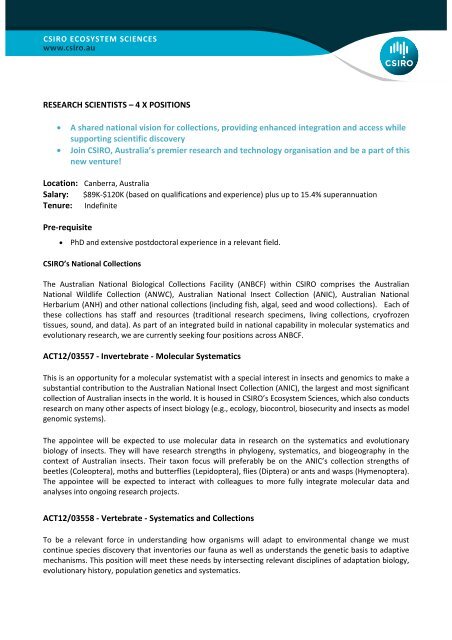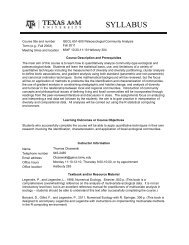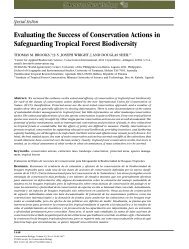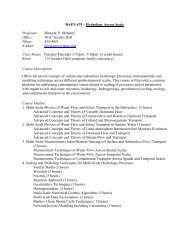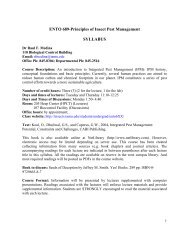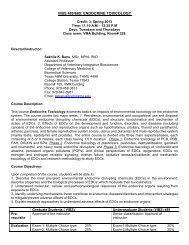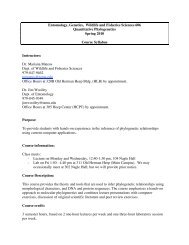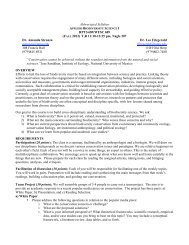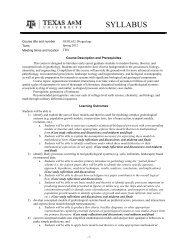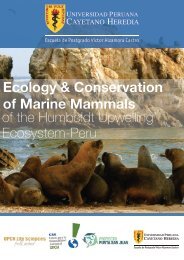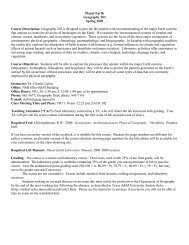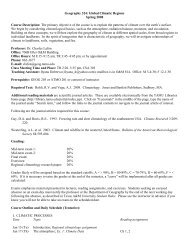4 Research-Collections Scientist Positions - Ecology and ...
4 Research-Collections Scientist Positions - Ecology and ...
4 Research-Collections Scientist Positions - Ecology and ...
Create successful ePaper yourself
Turn your PDF publications into a flip-book with our unique Google optimized e-Paper software.
CSIRO ECOSYSTEM SCIENCES<br />
RESEARCH SCIENTISTS – 4 X POSITIONS<br />
• A shared national vision for collections, providing enhanced integration <strong>and</strong> access while<br />
supporting scientific discovery<br />
• Join CSIRO, Australia’s premier research <strong>and</strong> technology organisation <strong>and</strong> be a part of this<br />
new venture!<br />
Location: Canberra, Australia<br />
Salary: $89K-$120K (based on qualifications <strong>and</strong> experience) plus up to 15.4% superannuation<br />
Tenure: Indefinite<br />
Pre-requisite<br />
• PhD <strong>and</strong> extensive postdoctoral experience in a relevant field.<br />
CSIRO’s National <strong>Collections</strong><br />
The Australian National Biological <strong>Collections</strong> Facility (ANBCF) within CSIRO comprises the Australian<br />
National Wildlife Collection (ANWC), Australian National Insect Collection (ANIC), Australian National<br />
Herbarium (ANH) <strong>and</strong> other national collections (including fish, algal, seed <strong>and</strong> wood collections). Each of<br />
these collections has staff <strong>and</strong> resources (traditional research specimens, living collections, cryofrozen<br />
tissues, sound, <strong>and</strong> data). As part of an integrated build in national capability in molecular systematics <strong>and</strong><br />
evolutionary research, we are currently seeking four positions across ANBCF.<br />
ACT12/03557 - Invertebrate - Molecular Systematics<br />
This is an opportunity for a molecular systematist with a special interest in insects <strong>and</strong> genomics to make a<br />
substantial contribution to the Australian National Insect Collection (ANIC), the largest <strong>and</strong> most significant<br />
collection of Australian insects in the world. It is housed in CSIRO’s Ecosystem Sciences, which also conducts<br />
research on many other aspects of insect biology (e.g., ecology, biocontrol, biosecurity <strong>and</strong> insects as model<br />
genomic systems).<br />
The appointee will be expected to use molecular data in research on the systematics <strong>and</strong> evolutionary<br />
biology of insects. They will have research strengths in phylogeny, systematics, <strong>and</strong> biogeography in the<br />
context of Australian insects. Their taxon focus will preferably be on the ANIC’s collection strengths of<br />
beetles (Coleoptera), moths <strong>and</strong> butterflies (Lepidoptera), flies (Diptera) or ants <strong>and</strong> wasps (Hymenoptera).<br />
The appointee will be expected to interact with colleagues to more fully integrate molecular data <strong>and</strong><br />
analyses into ongoing research projects.<br />
ACT12/03558 - Vertebrate - Systematics <strong>and</strong> <strong>Collections</strong><br />
To be a relevant force in underst<strong>and</strong>ing how organisms will adapt to environmental change we must<br />
continue species discovery that inventories our fauna as well as underst<strong>and</strong>s the genetic basis to adaptive<br />
mechanisms. This position will meet these needs by intersecting relevant disciplines of adaptation biology,<br />
evolutionary history, population genetics <strong>and</strong> systematics.
The appointee will be expected to lead in CSIRO’s embracing of genomics in evolutionary biology as applied<br />
to natural populations of vertebrates. They will work at the intersection of phylogeny <strong>and</strong> adaptation,<br />
systematics <strong>and</strong> population genetics, biogeography <strong>and</strong> phylogeography especially as applied in the context<br />
of Australo-Papuan vertebrates. Their focus will be on the ANWC’s vertebrate collections (especially birds<br />
<strong>and</strong> mammals) but developing capacity in any terrestrial vertebrate group would be encouraged /<br />
supported. The appointee will be expected to develop a field program that will contribute to growth of the<br />
collections.<br />
ACT12/04633 - Plant Molecular Systematics <strong>and</strong> Evolutionary Genomics (x2)<br />
We are seeking to appoint two early to mid-career scientists with interests in undertaking research on the<br />
Australian Flora in the areas of molecular systematics, evolutionary genomics <strong>and</strong> phylogeography. A solid<br />
grounding in collections-based science is still seen as essential to this work. The positions are based at the<br />
Australian National Herbarium within the CSIRO’s Division of Plant Industry, which also conducts research<br />
on many other aspects of plant biology (e.g. ecology, developmental biology, crop breeding, molecular<br />
biology <strong>and</strong> genomics). The Australian National Herbarium is a component of a joint venture in biodiversity<br />
science between CSIRO <strong>and</strong> the Federal Department of Sustainability, Environment, Water, Populations <strong>and</strong><br />
Communities, through the Australian National Botanic Gardens.<br />
About CSIRO<br />
Australia is founding its future on science <strong>and</strong> innovation. Its national science agency, CSIRO, is a powerhouse<br />
house of ideas, technologies <strong>and</strong> skills for building prosperity, growth, health <strong>and</strong> sustainability. It serves<br />
governments, industries, business <strong>and</strong> communities across the nation. Find out more! www.csiro.au.<br />
For further information <strong>and</strong> to apply online for the above positions please visit our website at CSIRO CAREERS,<br />
choose "Jobs Search" <strong>and</strong> insert the Job Reference Number where indicated.<br />
Applications close: 11.30pm (EST) on 30 January 2013.


